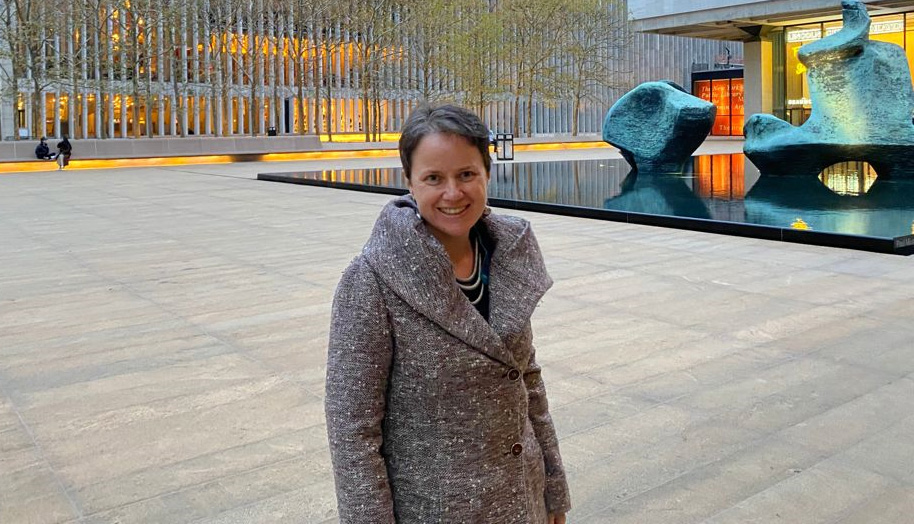When police commit crimes, who holds them to account?

Recent killings – from George Floyd to Roman Bondarenko and many others – have highlighted global patterns of violence committed by police, shining a light on the need for greater police accountability.
“Who Polices the Police?” is a major report published this year and co-authored by Masha Lisitsyna, one of our Fellows from Kyrgyzstan.
It explores how independent investigative agencies and prosecutorial departments around the world investigate and prosecute serious crimes allegedly committed by police and other state agents.
Masha, senior managing legal officer for accountability at the Open Society Justice Initiative, focuses on criminal justice reforms in Eurasia, Latin America, and South and Southeast Asia. Her work involves litigation and advocacy to improve protection from torture. The report’s recommendations will help policy makers, practitioners and activists in their efforts to establish new mechanisms of police accountability and improve the independence, efficacy, and transparency of existing ones.

A lifetime commitment to justice
In 1995 when Masha joined one of the first human rights organisations established in newly independent Kyrgyzstan, she hadn’t fully appreciated the journey she was embarking on. She says: “It was a serendipitous opportunity that has evolved into a lifetime commitment. There was an air of change. We had true hope that a new state was being built, with much greater democracy and respect for people’s rights. Knowledge that we take for granted today – about international standards, mechanisms to defend rights, guarantees of rule of law – it was all new.”
A year after starting her work, Masha co-founded Youth Human Rights Group (YHRG) with friends from her university. The team initially chose to focus on legal reform for the protection of children and young people. Later their work evolved and included human rights education for legal professionals and teachers. It also involved litigation and monitoring of closed institutions such as orphanages, psychiatric hospitals and prisons.
At the time of her fellowship with the John Smith Trust in 2006, Masha was already making her mark as a champion for justice and was an elected member of the Constitutional Council of Kyrgyzstan.
John Smith Trust fellowship
During her six weeks in the UK as a Fellow, Masha developed an action plan to help improve freedom of information mechanisms back home. Kyrgyzstan was developing its first access to information law then, and Masha spent her placement meeting with people from places such as the Information Commissioner’s Office and freedom of expression organisations such as Article 19.
Upon her return home, she participated in non-governmental working groups that contributed to Kyrgyzstan’s draft law on access to information. The connection she made with Article 19 while in the UK also led to detailed analysis of the draft by this organisation, that was then presented in Kyrgyzstan and helped civil society activists advocate for significant improvements to the law.
Masha says: “The John Smith Trust Fellowship was an important journey in understanding UK approaches to the rule of law, its focus on checks and balances, independent agencies and oversight. And the time at the Information Commissioner’s Office sparked my interest in oversight bodies that has continued ever since. Who Polices the Police? includes examples of police oversight bodies in England and Wales, as well as Northern Ireland.”
Making hard decisions
After a decade of leading YHRG, Masha knew that a founding director should leave. “I did not want to become a fifty-year-old leader of a youth organisation,” she says.
“Leaving YHRG as a successful organisation, with a good team, in good financial standing, was the hardest choice of my life and the one I am most proud of. First, I was concerned how they would do without me. Then, I got even more worried about what I will do without them. And we all did well.” Masha applied for a position as a researcher on Central Asia at Human Rights Watch and moved to New York.
Despite being based in New York for many years now, through her projects Masha remains actively involved in supporting strategic human rights litigation and criminal justice reforms in Kyrgyzstan and the region. “And the network of fellows is an important source of advice and inspiration,” says Masha.
Seeking justice, against the odds
Side-by-side with her fellow activists, Masha is in it for the long haul. The progress can sometimes be slow but they are steadily seeking justice for victims of violence committed by states.
They have litigated before the UN on cases from Kyrgyzstan, Kazakhstan, Uzbekistan and Turkmenistan. In Kyrgyzstan and Kazakhstan, they obtained the first in the world judgements that UN decisions in individual cases should be mandatory for states.
As Masha explained in a recent paper published by the University of Bristol: “States rarely want to accept accountability for rights violations and advocates need to start somewhere, despite the odds. While leveraging international obligations requires advocates to commit to long litigation timelines, the growing use of the UN individual complaints mechanisms offers survivors and families of victims an opportunity to seek justice. In some cases, it can also force states to finally face facts and implement the change that is required of them.”
Out of the comfort zone
Although Masha believes she has mellowed with age, she says: “I am still somewhat an idealist. Working on Who Polices the Police? was hard. I am used to advocacy or litigation initiatives based on international human rights standards, where you know what ‘good looks like’.
“Creating independent agencies is about policy, about choices, and none are ideal. This work truly forced me to get out of my comfort zone and put out recommendations that might work or not in each individual context. I am heartened by the interest this work sparked in many countries. It is being used in policy recommendations from Austria to Georgia to Nepal.
“This work is a privilege. And I believe the experience of being an activist in my own country gives legitimacy for international work. It helps me know what I do not know, to respect and learn the views of partners, to share experiences, knowing that none can be replicated but some lessons can be learned.”
Find out how Muhaiyo Nozimova is fostering young journalistic talent and media literacy in Central Asia
